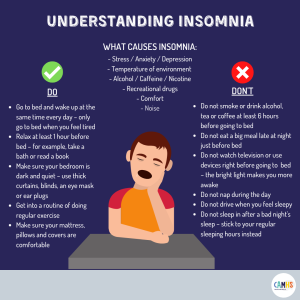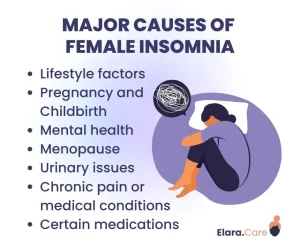Have you been tossing and turning, struggling to fall asleep at night? Counting sheep to no avail? Or maybe you find yourself awake at 3 am staring at your ceiling. Dangerous time to be awake, if you ask me(and every horror movie ever). We’ve all been there and dealing with insomnia is a real problem. Let’s help you catch some zzz’s😴.
What really is insomnia?

Insomnia, a sleep disorder characterized by difficulty falling asleep or staying asleep, can be triggered by a variety of factors including stress, anxiety, poor sleep habits, or even caffeine consumption. Statistics say that is affects 30% to 50% of adults and 1 in 3 people have had short term insomnia at a point in ther life . That means that you’ve probably experienced it or you will. Thankfully, when sheep-counting just won’t cut it, there are a few clever strategies to consider.
Having a sleep routine
Establishing a sleep routine is key. Going to bed and waking up at the same time every day helps regulate our body’s internal clock. Our bodies thrive on consistency, and implementing a regular sleep schedule sends a signal to our brain that it’s time to wind down. So, set a bedtime alarm, switch of your phone and cozy up to a consistent sleep routine.
Prep your environment
Creating a relaxing environment in the bedroom can make a world of difference when it comes to tackling insomnia. Invest in a comfy mattress and cozy blankets that help create a sense of comfort and tranquility. Consider dimming the lights or using blackout curtains to block out any external sources of light that may disturb your sleep. Keep the room at a cool temperature, as a slightly cool environment can contribute to optimal sleep conditions.
Reducing screen time
It’s important to avoid stimulating activities close to bedtime. Put away the smartphone, turn off the TV, and instead, try engaging in relaxing activities that promote a sense of calm. Activities such as meditation, journaling or reading a book can help shift our focus away from racing thoughts and into a state of relaxation. Creating a bedtime routine that includes these activities can signal to both your mind and body that it’s time to unwind and prepare for sleep. Drink a cup of herbal tea, listen to some calming music, white noise or rain sounds.

Consult a doctor
If all else fails and sleep remains elusive, it might be time to seek professional help. Consulting a doctor or sleep specialist can offer insight into underlying causes and provide potential solutions. They might recommend therapy such as cognitive-behavioral therapy for insomnia (CBT-I), which focuses on addressing and modifying patterns and behaviors that contribute to sleeplessness. In some cases, medication might be prescribed, although it’s generally seen as a last resort and is usually reserved for short-term use.
Remember, getting enough sleep is essential for overall well-being. Lack of sleep can lead to decreased cognitive function, mood swings, and a general feeling of fatigue. So, let’s bid farewell to those sleepless nights and welcome sweet dreams with open arms.







